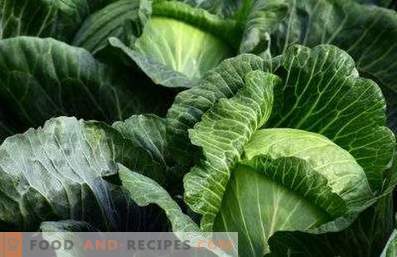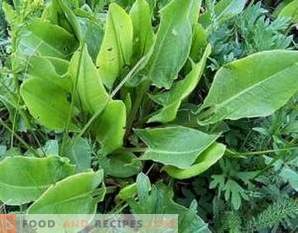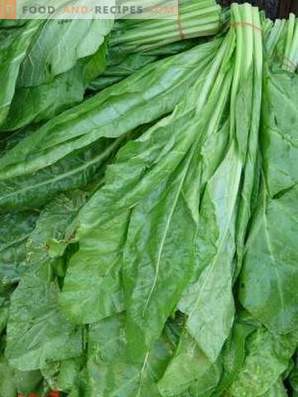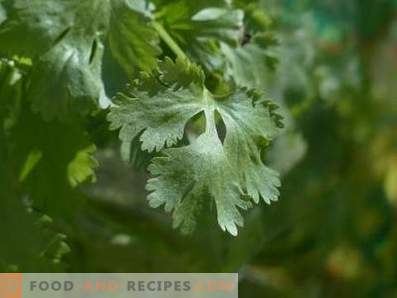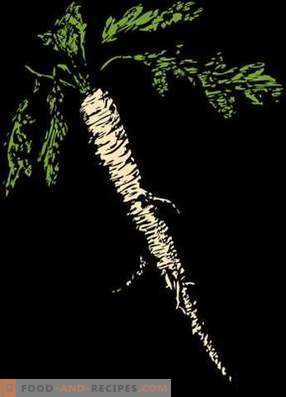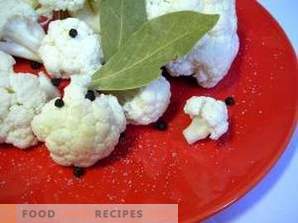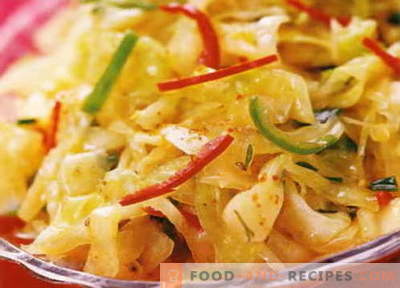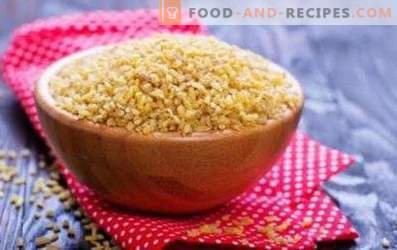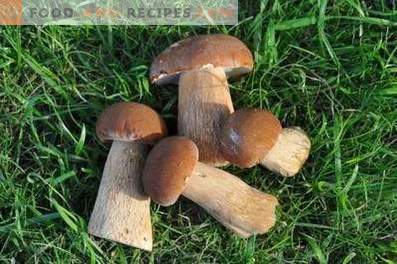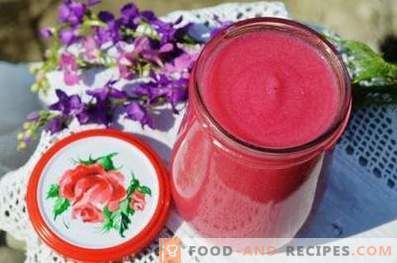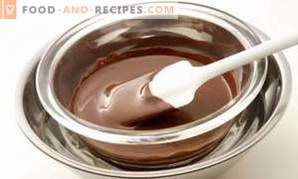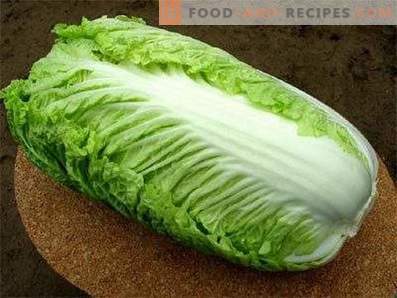
Peking cabbage (petsai) is a popular vegetable of the Cabbage family. Homeland plants - the territory located in the Yangtze River Delta. Ancient writings indicate that the locals were able to master the technology of cultivation of this culture in the V century.
After several centuries, Peking cabbage began to be cultivated in Korea, Japan and Indochina. In Europe and the USA, they became interested in this crop much later - after the Japanese breeders managed to produce early ripening pets in the middle of the 20th century and were able to produce a rich crop and were stored for long periods in adverse climatic conditions. Nevertheless, China remains the largest supplier of Chinese cabbage to the international market.
Petsaya leaves - a valuable food product. They are eaten fresh and stewed, used in cooking as salad greens. Experienced chefs prepare soups, casseroles, cabbage rolls and various side dishes from Peking cabbage, and traditional healers use the leaves of this plant to combat a whole range of pathologies.
Botanical description of Peking cabbage
Petsay is a two-year-old vegetable crop, but it is grown as one-year in agriculture. The plant has a developed fibrous root. The elongated, wrinkled, swollen Beijing cabbage leaves form dense rosettes with a diameter of up to 50 cm or loose cylindrical heads of cabbages. The color of leaf plates can vary from pale yellow to bright green. Veins on the leaves are flat, wide and fleshy.
Peking cabbage loves heat and moisture. At temperatures below 15 ° C or under long daylight conditions, the plant releases an arrow and blooms with small yellow flowers, gathered in racemes. Petsay is a thin elongated pod within which the rounded seeds of a light brown color ripen.
How to choose and store Peking cabbage
When buying Chinese cabbage you need:
- make sure that condensate does not accumulate under the food film in which the product is wrapped (moisture under the packaging is a consequence of improper storage of vegetables);
- to make sure that cabbage leaves are elastic, fresh and dry (if the seller constantly refreshes the vegetables by spraying them from a spray bottle with water, then they very quickly lose their nutritional properties);
- make sure that there is no rot, mucus, dark spots or light deposits on the surface of the head;
- choose small cabbages of medium density.
It is important to remember that a quality petsai does not smell. If an unusual odor emanates from the head, it means that the vegetable was grown using growth stimulants or treated with chemicals before transportation.
Beijing cabbage should be stored in the dark at a temperature of 3 ° C and a humidity of 95-98%. At the same time, each head must be wrapped with paper or cling film. Subject to the conditions described, petsay retains its nutritional properties for 90 days.
Nutritional value of Peking cabbage
100 g of fresh Peking cabbage contains:
- 1, 193 g of proteins;
- 0, 196 g of fat;
- 3, 218 g of carbohydrates;
- 1, 421 g of sugars (mono- and disaccharides);
- 1, 188 g of dietary fiber;
- 94, 381 g of water;
- 0, 976 g of ash.
In addition, the product contains a complex of amino acids, fatty acids.
Vitamins in Chinese cabbage
100 grams of Petsaya contains the following vitamins:
- retinol equivalent (A) - 15, 596 μg;
- alpha carotene - 0, 984 mcg;
- beta-carotene - 0, 189 mg;
- zeaxanthin and lutein - 47, 811 mcg;
- thiamine (B1) - 0, 038 mg;
- Riboflavin (B2) - 0, 048 mg;
- choline (B4) - 7, 703 mg;
- pantothenate (B5) - 0, 104 mg;
- pyridoxine (B6) - 0, 231 mg;
- folic acid (B9) - 78, 044 μg;
- ascorbic acid (C) - 26, 918 mg;
- tocopherol equivalent and alpha-tocopherol (E) - 0, 118 mg;
- phylloquinone (K) - 42, 874 mcg;
- nicotinic acid (PP) - 0, 394 mg.
Along with this, Peking cabbage contains the vitamin-like substance betaine. The concentration of this compound is 0, 286 mg per 100 g of product.
Calories of Beijing cabbage
In 100 g of raw Peking cabbage 15, 776 kcal. When cooking, the calorie content of this product increases slightly. So, in 100 g stewed Petsaya contains 18, 969 kcal, and in a similar portion of pickled cabbage leaves - 19, 011 kcal. The energy value of 100 grams of cabbage cabbage from Peking cabbage is 105, 014 kcal.
Useful items in the product
Trace elements in a 100-gram serving of Peking cabbage:
- 0, 309 mg of iron;
- 37, 011 μg of copper;
- 0, 186 mg of manganese;
- 0, 224 mg of zinc;
- 0, 577 mkg of selenium.
Macroelements per 100 g of product:
- 237, 809 mg of potassium;
- 8,883 mg of sodium;
- 76, 823 mg of calcium;
- 28, 878 mg of phosphorus;
- 12, 992 mg of magnesium.
Useful properties of Peking cabbage
- Petsai is a dietary product with low energy value. Overweight people can safely include this vegetable in their daily diet.
- It has been proven that substances present in Chinese cabbage contribute to a decrease in blood sugar concentration. Dishes from this product benefit people suffering from diabetes.
- Cabbage leaves are a rich source of potassium, magnesium and other nutrients that positively affect the cardiovascular system. With regular consumption of this product, the heart muscle is strengthened, vascular walls become more durable and elastic, the heartbeat normalizes, and cholesterol plaques dissolve.
- Lysine and other compounds with which Beijing cabbage is rich strengthen the immune system, reduce the risk of developing colds and infectious diseases.
- Peking cabbage is a rich source of fiber. Coarse dietary fiber helps to improve the processes of digestion, remove excess fluid from the body, poisons, toxins, slags and other harmful compounds. In Eastern medicine, Petsaya juice was used to prevent gastritis, colitis, duodenitis, and other gastrointestinal diseases.
- Substances present in the Petsai strengthen the hair roots.
- When Peking cabbage is consumed, antioxidants enter the body that can block the negative effects of free radicals. People who regularly eat dishes from this vegetable are less likely to experience manifestations of cancer.
- Peking cabbage juice is useful for people suffering from arthritis and other diseases of the joints. This tasty and healthy drink helps relieve pain, prevent the spread of inflammation in the affected area, slow down the progression of the disease.
- Vitamins of group B, which are rich in petsay, help to normalize the work of the central nervous system, avoid nervous breakdowns, reduce the negative impact of stress on the body.
- In traditional medicine, Peking cabbage is used to combat somnologicheskimi violations. For the preparation of insomnia, 160 g of chopped cabbage leaves is poured with water (380 ml), the mixture is brought to a boil and kept on the fire for half an hour. The resulting liquid is filtered and drunk for 1, 5-2 hours before bedtime.
- Petsai dishes help to speed up lipid, protein and carbohydrate metabolism in the body.
- Juice from Beijing cabbage leaves has anti-inflammatory properties. Folk healers recommend using it to rinse your mouth with sore throat, gingivitis or stomatitis.
- Petsai contains substances that stimulate blood formation. Therefore, salads and other dishes made from this vegetable are useful for people who are faced with the problem of anemia.
- Folk healers recommend that women suffering from mastopathy, apply crumpled leaves of Peking cabbage to their breasts. Such compresses help to ease the unpleasant symptoms of the disease.
- Beijing cabbage is used to treat inflammatory eye diseases. The large leaves of the plant (3 pcs.) Are boiled for 8 minutes, kneaded into mush and combined with 6 tsp of olive oil. The mixture is wrapped in sterile gauze and applied to the eyes for 25 minutes. The procedure is carried out every 9 hours until the symptoms of the disease disappear.
- Peking cabbage is used to prepare lotion that cleans pores and effectively copes with acne. The crushed leaves of the plant (50 g) are poured with water (150 ml) and boiled for about a quarter of an hour. Strained and cooled broth wipe problem areas of the skin twice a day.
- Peking cabbage juice is treated for nonhealing, suppurating wounds.
- Juice obtained from Petsaya leaves has anti-aging properties. Therefore, it is advisable to add it to masks designed to care for dry and loose skin.
Contraindications and harm to Peking cabbage
- Beijing cabbage may provoke the development of allergic reactions.
- Dishes prepared from this vegetable are contraindicated in case of internal bleeding, exacerbation of pancreatitis, and gastritis, which has developed on the background of increased acidity of gastric juice.
- Abuse of Peking cabbage can cause bloating, flatulence, nausea and diarrhea.
